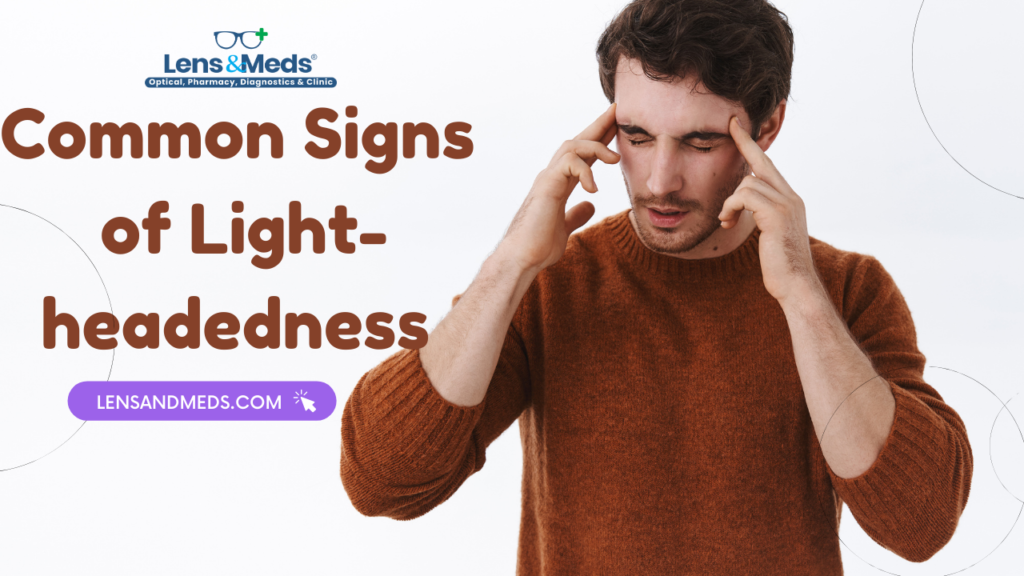It’s common to feel dizzy after an intense workout or when you stand up too soon. But if you’re wondering what else could be causing your fatigue, nausea, or dizziness, consider migraines, worry, or motion sickness as potential explanations.
Furthermore, dizziness that persists throughout the day may be a sign of a more serious problem. Continue reading to find out more about the reasons for your dizziness.
Common Signs of Light-headedness / Dizziness
Reasons for your dizziness: Dizziness can make you feel unsteady, queasy, and lightheaded. You might additionally encounter:
- Having trouble getting up or moving
- Headache
- Problems with vision
- Imbalance or hearing loss
- Vomiting and nausea
- Ringing sound in your ears Deficiency
Since dizziness is a symptom of many different disorders, there are a lot of reasons for your dizziness. Here are some things to consider regarding frequent causes of dizziness and ways to alleviate symptoms.

1. Inner Ear Issues
Vertigo is a frequent inner ear condition that impairs balance and coordination. A spinning feeling could be experienced by someone who has vertigo. Vertigo, for instance, can cause symptoms like motion sickness or a skewed perception of one side.
Sensitivity to Positional Vertigo
Vertigo is frequently brought on by an inner ear condition called benign paroxysmal positional vertigo (BPPV). Little calcium crystals known as canaliths break free and float in the fluid inside your inner ear tubes when you have BPPV. You may have disorientation and think that everything is whirling in your brain.
The Epley maneuver is a repositioning exercise that an ear, nose, and throat (ENT) specialist can use to help relieve vertigo. The Epley maneuver is a series of head motions designed to realign the crystals inside your inner ear.
Ménière’s Illness
Another typical inner ear issue brought on by excessive fluid accumulation in the ear is Ménière’s disease (MD). Apart from vertigo, symptoms associated with MD include:
- Variable hearing loss
- Tinnitus, or auditory hallucinations
- A fullness sensation in the ear
MD has no known treatment. However, medication, physical therapy, hearing aids, surgery, and lifestyle modifications, including a low-salt diet, may help control symptoms.
2. Migraines
About 7% of those with headaches and 9% of those with dizziness experience vestibular migraines, which result in vertigo. In addition to vertigo, migraines typically result in the following symptoms: 9
- Severe headache discomfort
- Nausea
- Light sensitivity
- Vomiting
Understanding some of the typical warning indicators can help you prepare for or avoid an episode if you suffer from chronic migraines. Additionally, a medical professional can ask you to record the onset, duration, and feeling of each of your symptoms.
3. Decreases in blood pressure
Dizziness may be brought on by low blood pressure after rising up after lying down. Known also as orthostatic hypotension, this kind of vertigo is caused by gravity swiftly transferring blood from the upper to the lower body.
4.Insufficient blood flow
Having poor blood flow to the brain can result in tingling, numbness, weakness, and dizziness. Your brain does not get as much blood as it needs if you have poor circulation.
Poor blood circulation can be brought on by cerebral vascular diseases or disorders involving the blood supply to the brain.
For instance, in rare instances, dizziness may be a sign of a transient ischemic attack (TIA), also referred to as a “mini-stroke.” Additional signs of TIA include:
-Hazy vision
-Issues with coordination
-Speaking with difficulty
-Weakness in a face or body part
A TIA causes a brief interruption in blood supply to the brain. To find out why you are experiencing a dizzy spell and any other TIA symptoms, get in touch with a healthcare professional right away.
5. Parkinson’s illness
Vertigo may be a symptom of Parkinson’s illness. The disease affects the motor system and causes trembling in the face, jaw, hands, arms, and legs.
People with Parkinson’s disease may experience dizzy spells if their blood pressure falls.
6. Prescription medications
If taking certain medications lowers blood pressure, it can lead to dizziness. These medications may consist of:
-Diuretics to aid in the body’s elimination of fluids and salt
-Heart medications, like beta blockers
-Prescription medications for Parkinson’s illness
-When treating depression, tricyclic antidepressants
If you’re feeling lightheaded, discuss your medicine with a medical professional. They might be able to change your dosage or recommend a different course of action that won’t result in that adverse effect.
7. Low blood sugar
Hypoglycemia, or low blood sugar, is a condition where the body doesn’t get enough sugar. Low blood sugar can cause symptoms such as trembling, lightheadedness, anxiety, weakness, and “hangry.” Speaking difficulties and confusion can also be caused by low blood sugar.
Snacking could be beneficial if you have low blood sugar. Carbohydrates, in particular, can assist in rapidly restoring normal blood sugar levels. If you have that kind of dizziness frequently, speaking with a doctor could be beneficial.
8. Low red blood cell count
It’s critical to consume adequate iron through food or supplements. Iron boosts your immune system and aids in the production of red blood cells. Iron-deficiency anemia can develop if your body does not contain enough iron.
People with severe cases of that kind of anemia may also experience symptoms such as:
-Heavyheadedness or dizziness
-Fatigue or exhaustion
-Frosty feet and hands
-Difficulties breathing
You can lower your risk of iron deficiency by eating more iron-rich foods, such as nuts, seeds, lean meats, and seafood. Iron-deficiency anemia can also be brought on by heredity or medical diseases like celiac disease in certain individuals. In some circumstances, raising iron levels may require the use of medications or supplements.

9. Dehydration
It is possible to become dizzy from not drinking enough water. You may also experience decreased sweating, dark urine, and increased thirst and urination due to dehydration.
Dehydration can be brought on by underlying medical disorders like diabetes or high blood pressure. Consult a healthcare professional about any enduring signs of dehydration, such as lightheadedness. To increase hydration, try drinking when you’re thirsty and consuming fruits and vegetables high in water, such as melons and cucumbers.
10. Disorders of Anxiety
In addition to dizziness, anxiety and panic attacks can also result in the following physical symptoms:
-An intense heartbeat
-Sweating, trembling, or chills
-Hands that have a tingling or numb sensation
-Difficulties breathing
-Inexplicable discomfort and aches
-Weakness
That kind of vertigo can be avoided by avoiding anxiety triggers such as coffee and some medications. Some triggers, nevertheless, are more difficult to avoid. If you sense that an anxiety attack is about to develop, concentrate on breathing more slowly or repeating a peaceful mantra. Breathing quickly and shallowly will just make you feel more lightheaded or dizzy.
11. Illnesses Related to Heat
Lightheadedness and dizziness might result from heat exposure if you’re not hydrated or ready for high temperatures. You may also experience confusion and nausea from heat-related ailments.
Reduce the amount of time you spend outside, stay cool, and stay hydrated if you’re in an area with extreme temperatures. Help someone who appears to be unwell due to heat by getting them out of the sun. If you have serious symptoms, get help as soon as you can.
12. Motion Illness
Dizziness that happens when traveling by vehicle, rail, aircraft, or boat is known as motion sickness. Cold chills and nausea are common symptoms of motion sickness before it manifests as dizziness.
Your brain receives conflicting signals. Your arms and legs inform you that you are sitting motionless, yet your sight and hearing inform your body that it is in motion.
Certain drugs can be helpful, such as Dramamine (dimenhydrinate). Sitting where the journey will be smoother and gazing off into the distance can also help to de-stress.
13. Hypersensitivity to Food
Dizziness can be brought on by allergic reactions and the ensuing reduction in blood pressure. An allergic reaction triggered by specific proteins in food is known as a food-based reaction. The symptoms of these reactions can range from moderate to severe, even potentially fatal.
If at all possible, stay away from your trigger foods and use caution when dining out. To help with symptoms, a medical professional could suggest antihistamines or prescribe steroids.
Conclusion on Dizziness
There are numerous potential reasons for dizziness or lightheadedness, some more dangerous than others. A dizzy episode could be the result of an underlying medical issue or a transient motion sickness side effect. In any event, it’s critical to look into the reasons behind your lightheadedness and speak with a medical professional.

Leave a Reply